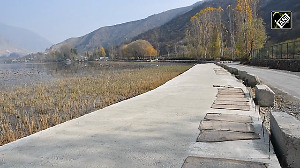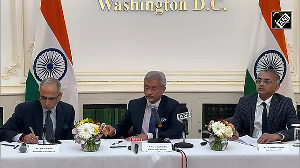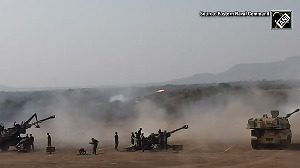In its report submitted to a local court on the complaint of Zakia Jaffery, the SIT has said no charges levelled by the widow of former Congress member of Parliament Eshan Jaffery (killed in riots) are maintainable and also questioned the intention behind filing such a complaint four years after the incident.
On the allegations that Modi, in a meeting of February 27, 2002, had told top police officers to allow Hindus to vent their anger in wake of the Godhra train burning incident, the SIT has said there is no basis for levelling such charges.
But even if such allegations are believed for sake of argument it does not constitute any offence, the SC-appointed probe agency maintained.
The SIT finding is contradictory to the report of amicus curie Raju Ramchandran, who has opined that Modi can be prosecuted for "promoting enmity among different groups".
Ramchandran, a Supreme Court lawyer, has based his report on the testimony of suspended Indian Police Service officer Sanjiv Bhatt, who in an affidavit filed in the apex court, had alleged Modi gave instructions to top police officers to go slow on rioters.
The SIT report said, "Law and order review meetings were held by Modi and all the things were done to control the situation. It further said the army was called on time to contain the communal violence."
It said, "Modi was busy with steps to control the situation, establishment of relief camps for riot victims and also with efforts to restore peace and normalcy."
The interpretations made on alleged illegal instructions given by the chief minister by police officers R B Sreekumar and Sanjiv Bhatt appear to be without any basis. Further, even if such allegations are believed for sake of argument, a mere statement of alleged words in the four walls of a room does not constitute any offence," the report said about the alleged illegal order of the chief minister. "In view of the detailed inquiry and satisfactory explanation of the person involved, no criminal case is made out against Narendra Modi."
The report goes on to question Zakia for delay in filing a complaint against Modi and others, alleging their complicity in the riots which left over 1,000 people dead.
Zakia was examined by the police for the first time in connection with the Gulburg Society cases on March 6, 2002 but she did not come up with allegations against Modi and others.
She appeared before the Nanavati Commission, probing the riots, on August 29, 2003 but did not disclose the facts given in this said complaint, the SIT said.
In September 2003, she filed an affidavit in the apex court but did not level allegations against Modi and others. "It was for the first time in June 6, 2006, after a lapse of four years, that she came up with the said complaint.
The allegations in the complaint are vague, general and stereotyped," said the SIT, headed by former Central Bureau of Investigation director R K Raghavan.
Regarding Ramchandran's report, the SIT has said the amicus curie had "erred" by relying solely on the statements given by Bhatt and concluding that certain offences can be made out against Modi.
The view of the amicus curiae that it does not appear very likely that a serving police officer would make such a serious allegation without some basis seems to be erroneous as Bhatt had been all along a delinquent in his career and trying to bargain with the government, the report said.
The SIT has demolished all allegations raised in Ramchandran's report submitted to the court.
The SIT closure report, which runs into 541 pages, has said all seven top officers of the state administration had denied Bhatt's presence at the February 27 meeting. These police officers and bureaucrats of the home
department had denied that Modi had made any such statements (about giving free hand to rioters), it said.
"The claim of Bhatt has been dismissed by K D Chakravarthi, the then DGP, who has denied that Bhatt accompanied him in his staff car to the chief minister's residence. Significantly, the logbook of the vehicle of Chakravarthi has no mention of Sanjiv Bhatt."
"The amicus curiae has agreed with the findings of the SIT on all major issues. Whereas the complainant (Zakia) has made an allegation that the chief minister sponsored the riots, the amicus curiae has come to the conclusion that sufficient steps were taken by the chief minister to control the riots. The amicus curiae did not allege any conspiracy or abetment on the part of chief minister," the SIT report noted.










 © 2025
© 2025